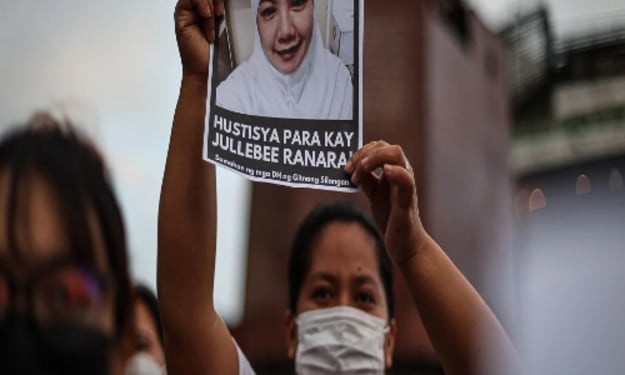
The recent verdict by a Kuwaiti court regarding the teen killer responsible for the murder of overseas Filipino worker (OFW) Jullebee Ranara brings a measure of resolution to a tragic incident that has deeply affected the global community. The court's conviction of the young perpetrator on charges of murder and driving without a license reflects the severity of the crimes committed. Despite the offender's status as a minor, the court imposed a 15-year prison sentence for the murder and an additional one year for driving without a license, signaling a commitment to accountability for heinous acts.
Jullebee Ranara, a 35-year-old household worker, met a horrifying fate when her burnt body was discovered in a desolate Kuwaiti desert in January. The swift arrest of the 17-year-old son of her employer within 24 hours, coupled with his subsequent confession, provided crucial evidence for the case. Due to the killer's minor status, the court opted for comparatively lesser penalties, granting the convicted murderer a 30-day window to appeal the judgment to the Court of First Instance. This allows for a legal avenue for further scrutiny of the case and ensures a thorough examination of the circumstances surrounding the crime.
The Department of Foreign Affairs (DFA) in the Philippines played a pivotal role in monitoring the case and providing support throughout Ranara's legal proceedings. The acknowledgment of Kuwaiti authorities' efforts by the DFA underscores the collective commitment to seeking justice for the slain OFW. The family of Jullebee Ranara, now informed of the court's decision, expressed gratitude for the unwavering support provided by the Philippine government during the investigation and legal proceedings.
In a televised public briefing, DFA Undersecretary Eduardo de Vega shed light on the family's reactions. While Ranara's sister expressed contentment with the justice served, her mother initially anticipated a life imprisonment sentence for the killer. De Vega clarified that under Philippine laws, minors are generally exempted from criminal liability, providing context for the family to understand the court's decision. The family is now awaiting details on moral damages, adding another layer to the aftermath of this tragic incident.
Throughout the legal proceedings, the DFA covered Ranara's legal expenses from January to July. The Department of Migrant Workers (DMW) assumed financial responsibility for the lawyers thereafter, ensuring the continuation of legal support. Additionally, the DMW pledged free education for Ranara's children, emphasizing the broader impact on the victim's family and addressing the long-term consequences of such incidents on affected families.
Despite the gravity of the situation, Ranara's family has not received any compensation from her previous employer. De Vega clarified that the benefits received by the family were sourced from various government entities. He emphasized that blood money is not applicable in this case due to the absence of the death penalty, leaving the court's decision to determine the amount for moral or compensatory damages—a form of restitution for the family.
Kabayan Partylist Rep. Ron Salo, the chairperson of the House of Representatives’ Committee on Overseas Workers Affairs, lauded the Kuwaiti court's verdict. He praised the government for swiftly delivering justice for Ranara, considering it a significant milestone in ensuring accountability for crimes against Filipino migrant workers. Salo's remarks underscore the importance of sending a clear message that such crimes will not go unpunished. However, he also highlighted the ongoing need to prioritize efforts in creating safer and more secure working conditions for overseas Filipino workers (OFWs). This verdict, though a positive step, serves as a reminder of the continuous challenges faced by OFWs and the necessity for sustained advocacy for their well-being.
As the legal proceedings reach a conclusion, the case of Jullebee Ranara resonates beyond the courtroom, prompting reflections on the broader issues surrounding the well-being and protection of OFWs worldwide. The international community, along with the Philippine government, is reminded of the ongoing challenges and responsibilities in ensuring the safety and justice for those who seek employment abroad. The tragic circumstances of Jullebee Ranara's case call for continuous efforts in addressing systemic issues and providing comprehensive support to OFWs, both in times of crisis and as a preventive measure against future injustices. This tragedy serves as a stark reminder of the vulnerability of OFWs and the imperative to implement measures that safeguard their rights and well-being on a global scale.

About the Creator
Bew
Read and provide feedback on my articles, and I'll reciprocate by reading and commenting on yours as well!





Comments (1)
Good work summarizing this story and shedding light on such crimes and punishments.